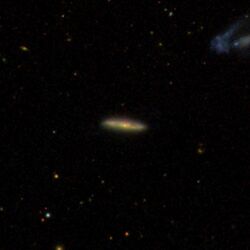Astronomy:NGC 3006
From HandWiki
Short description: Galaxy in the constellation Ursa Major
| {{{name}}} | |
|---|---|
 SDSS image of NGC 3006 | |
| Observation data (J2000 epoch) | |
| Constellation | Ursa Major |
| Right ascension | 09h 49m 17.344s[1] |
| Declination | +44° 01′ 32.90″[1] |
| Redshift | 0.01601[2] |
| Helio radial velocity | 4761 km/s[2] |
| Distance | 241.3 ± 16.9 Mly (73.97 ± 5.18 Mpc)[1] |
| Apparent magnitude (B) | 15.57[3] |
| Absolute magnitude (B) | −19.50[3] |
| Characteristics | |
| Type | Sbc[3] |
| Other designations | |
| MCG+07-20-055, PGC 28235[2] | |
NGC 3006 is an edge-on spiral galaxy in the constellation Ursa Major.[4] It has an apparent magnitude of 15.[5] It was discovered by the astronomer Bindon Stoney on January 25, 1851.[6]
It is part of a small group of galaxies including NGC 2998, NGC 3002, NGC 3005, NGC 3008, and MCG+07-20-052.[7]
References
- ↑ 1.0 1.1 1.2 "Results for object NGC 3006 (NGC 3006)". NASA/IPAC Extragalactic Database. California Institute of Technology. https://ned.ipac.caltech.edu/byname?objname=NGC%203006&hconst=67.8&omegam=0.308&omegav=0.692&wmap=4&corr_z=1. Retrieved 2021-08-27.
- ↑ 2.0 2.1 2.2 "NGC 3006". SIMBAD. Centre de données astronomiques de Strasbourg. http://simbad.u-strasbg.fr/simbad/sim-basic?Ident=NGC+3006.
- ↑ 3.0 3.1 3.2 "Search specification: NGC 3006". HyperLeda. Université Claude Bernard Lyon 1. http://leda.univ-lyon1.fr/ledacat.cgi?o=NGC%203006. Retrieved 2021-08-27.
- ↑ Ford, Dominic. "The galaxy NGC 3006 - In-The-Sky.org" (in en). https://in-the-sky.org/data/object.php?id=NGC3006.
- ↑ "VizieR". http://vizier.cfa.harvard.edu/viz-bin/VizieR-5?-out.all=1&-source=VII/1B&-c=NGC+3006,rm=5.0.
- ↑ Seligman, Courtney. "New General Catalogue objects: NGC 3000 - 3049". http://cseligman.com/text/atlas/ngc30.htm#3006. Retrieved 2021-08-27.
- ↑ Paudel, Sanjaya; Sengupta, Chandreyee; Yoon, Suk-Jin; Chhatkuli, Daya Nidhi (2020). "MCG+07-20-052: Interacting Dwarf Pair in a Group Environment". The Astronomical Journal 159 (4): 141. doi:10.3847/1538-3881/ab722f. Bibcode: 2020AJ....159..141P.
Coordinates: ![]() 09h 49m 17.344s, +44° 01′ 32.90″
09h 49m 17.344s, +44° 01′ 32.90″
 |
